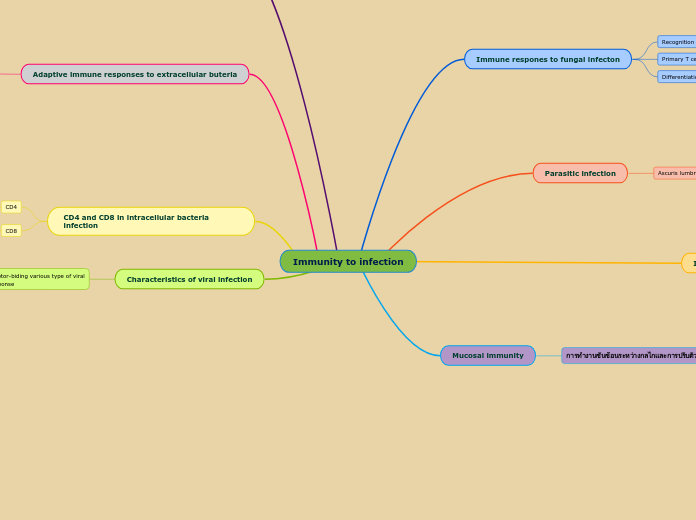Immunity to infection
Immune respones to fungal infecton
Recognition
Primary T cell differentiation
Differentiation of TH 17-----(Effector function againt fungal infection)
Parasitic infection
Ascuris lumbricoides or tapeworms filariul parasites
Physiologic effect
Giadia spp.---malabsorption
Diphyllobothrium latum
Tissue damage
Ectoparasitic worm---เฉพาะผิวหนัง
Th2 is the main type pf immune responed to parasitewarm
Immune privilege sites
เป็นระบบของภูมิคุ้นกันที่มีตลอด เช่น เยื่อบุตา
tolerate the introduction of antigen without elicting an inflammatory immune response
Microfold (M)cell
ส่งantigenไปที่underlying lymphoid tissue บุกรุกเข้าhostโดยใช้pathogenเป็นportalเพื่อบุกรุกเซลล์ ลำเลียงantigenไปเซลล์ของระบบภูมิคุ้มกันทำให้เกิดการตอบสนองของระบบภูมิคุ้มกัน
Adaptive immune responses to extracellular buteria
-ระบบภูมิคุ้มกันมีหน้าที่สำคัญในการป้องกันแบคทีเรียนอกเซลล์ -หน้าที่ของ antibody 1.block the infeution 2.eliminate the microbes 3.neutralize the toxin
Extracellular bacteria
Protein ของantigenเป็นสื่อกลางในการผลิตcytokineเพื่อประสิทธิภาพของเซลล์และหน้าที่
Staphylococcus aureus
Gram negative bacteria
Ig production as neutralizing Abs
Intracellular bacteria
Innate immunity
หลั่งIL-2โดยmacrophage
NK cell มีการกระตุ้นและหลั่งIFN-gammaทำให้การกระตุ้นmacrophage
กระตุ้นให้macrophageจับกินantigen
Adaptive immunity
Macrophage present peptide
via MHT molecule
กระตุ้นT cell (main Th1)ส่งผลให้เกิดmacrophage activation
CD4 and CD8 in intracellular bacteria infection
CD4
increase killing ability
CD8
Specific infection cell กระตุ้นCD8ผ่านpeptidreceptor ผ่านผิวเซลล์ มันจะฆ่าทำให้เซลล์แตกตาย แบคทีเรียอยู่ไม่ได้
Characteristics of viral infection
ต้องอยู่ในเซลล์เท่านั้น specific receptor-biding various type of viral strategies to evode immune response
Immunity to viral infection
Innate immunity
Direct killing NK cell induction of antiviral activation type I IFNหลั่งโดยpCD activation main of innate IR to prevent viral sperading
Adaptive immunity
cell-mediated immunity cytokine T-lymphocyte killed infected cell โดยperferin granzyme neutrolizing Ab
Mucosal immunity
การทำงานซันซ้อนระหว่างกลไกและการปรับตัว
Mucosal cytokines:กระตุ้น antigen ล่วงหน้า(CD,mast cell,eosiniphil,NK cell,gamma delta T-cell)
Subtopic
Cytokinesในการกระตุ้น antigenเตียมการตอบสนองเพื่อadaptive response shape
Such mediators includs suppressor cytokines เช่น K-10,T delta F beta
การนำเสนอ antigen DC และ Cytokine ปล่อยโดยเซลล์ ตอบสนองอย่างรวดเร็ว ส่งผลให้กระทบต่อ immunity ชนิด Th2
